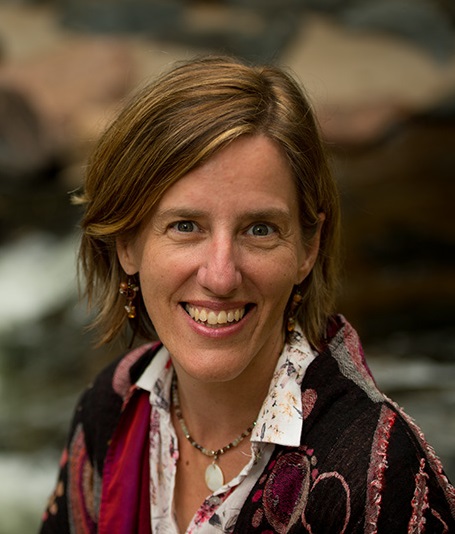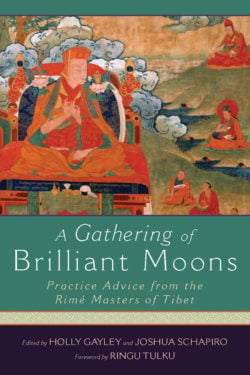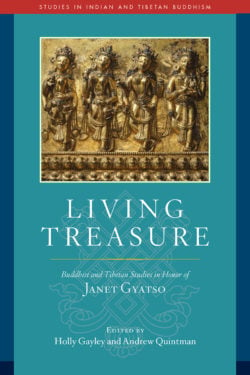Holly Gayley

Holly Gayley is associate professor of Buddhist Studies at the University of Colorado Boulder. Her research examines the revitalization of Buddhism on the Tibetan plateau since the 1980s with a special interest in issues of gender, agency, ethics, and identity in contemporary writings by Buddhist masters and cleric-scholars. Her first book is Love Letters from Golok: A Tantric Couple in Modern Tibet (2016), and she has written several articles on ethical reform by cleric-scholars at Larung Buddhist Academy in Serta for the Journal of Buddhist Ethics, Contemporary Buddhism, Himalaya Journal, and the Journal of Religious Ethics.
Books, Courses & Podcasts
A Gathering of Brilliant Moons
For generations, Buddhist masters in Tibet have composed sheldam, poignant instructions tailored to the needs of their disciples in the form of short works of advice. Often difficult to find in publication, these works cover topics ranging from practicing while ill to sitting in solitary retreat to recognizing the nature of mind. This collection focuses on an influential and inspiring generation of Buddhist teachers: the nineteenth-century ecumenical, or rimé, tradition of eastern Tibet. A Gathering of Brilliant Moons provides lively translations of nineteen pithy and profound works by these great masters, along with essays by their translators which explore the aesthetic qualities of their chosen works, highlight their ecumenical features, and comment on the journey of translation.
Includes works from Jamgon Kongtrul, Dza Patrul Rinpoché, Ju Mipham Rinpoché, Dudjom Lingpa, The Third Dodrupchen, Do Khyentsé, Tokden Sakya Sri, Jikmé Lingpa, Shardza Tashi Gyaltsen, Getsé Mahapandita, Shangton Tenpa Gyatso, and Bamda Thupten Gelek Gyatso.
This book arose from a unique conference on Tibetan translation, where the fourteen translators shared their process with each other and received feedback from their peers with a special focus on the literary aspects of the source texts. As a reflection of this genesis, the accompanying essays in this volume by the translators explore the aesthetic qualities of their chosen works, highlight ecumenical features in them, and comment on the journey of translation. This unique book will be welcomed by religious scholars, Buddhist practitioners, and meditators.
Living Treasure
Senior scholars and former students celebrate the life and work of Janet Gyatso, professor of Buddhist studies at Harvard Divinity School. Inspired by her contributions to life writing, Tibetan medicine, gender studies, and more, these offerings make a rich feast for readers interested in Tibetan and Buddhist studies.
Janet Gyatso has made substantial, influential, and incredibly valuable contributions to the fields of Buddhist and Tibetan studies. Her paradigm-shifting approach is to take a topic, an idea, a text, a term—often one that had long been taken for granted or overlooked—and turn it inside out, to radically reimagine the kinds of questions that might be asked and what the answers might reveal. The twenty-nine essays in this volume, authored by colleagues and former students—many of whom are now also colleagues—represent the breadth of her interests and influence, and the care that she has taken in training the current generation of scholars of Tibet and Buddhism. They are organized into five sections: Women, Gender, and Sexuality; Biography and Autobiography; the Nyingma Imaginaire; Literature, Art, and Poetry; and Early Modernity: Human and Nonhuman Worlds. Contributions include José Cabezón on the incorporation of a Buddhist rock carving in Central Asian culture; Matthew Kapstein on the memoirs of an ambivalent reincarnated lama; Willa Blythe Baker on Jikmé Lingpa’s theory of absence; Andrew Quintman on a found poem expressing worldly sadness on the forced closure of a monastery; and Padma ’tsho on Tibetan women’s advocacy for full female ordination. These and the many other chapters, each fascinating reads in their own right, together offer a glowing tribute to a scholar who indelibly changed the way we think about Buddhism, its history, and its literature.
Learn more about the Studies in Indian and Tibetan Buddhism series.


